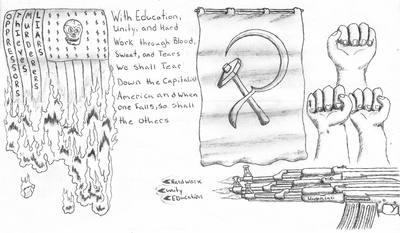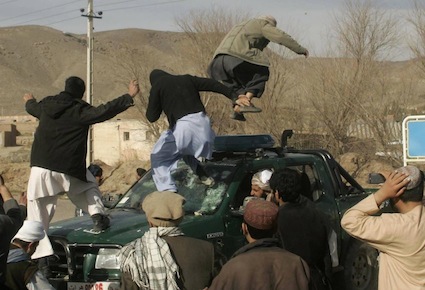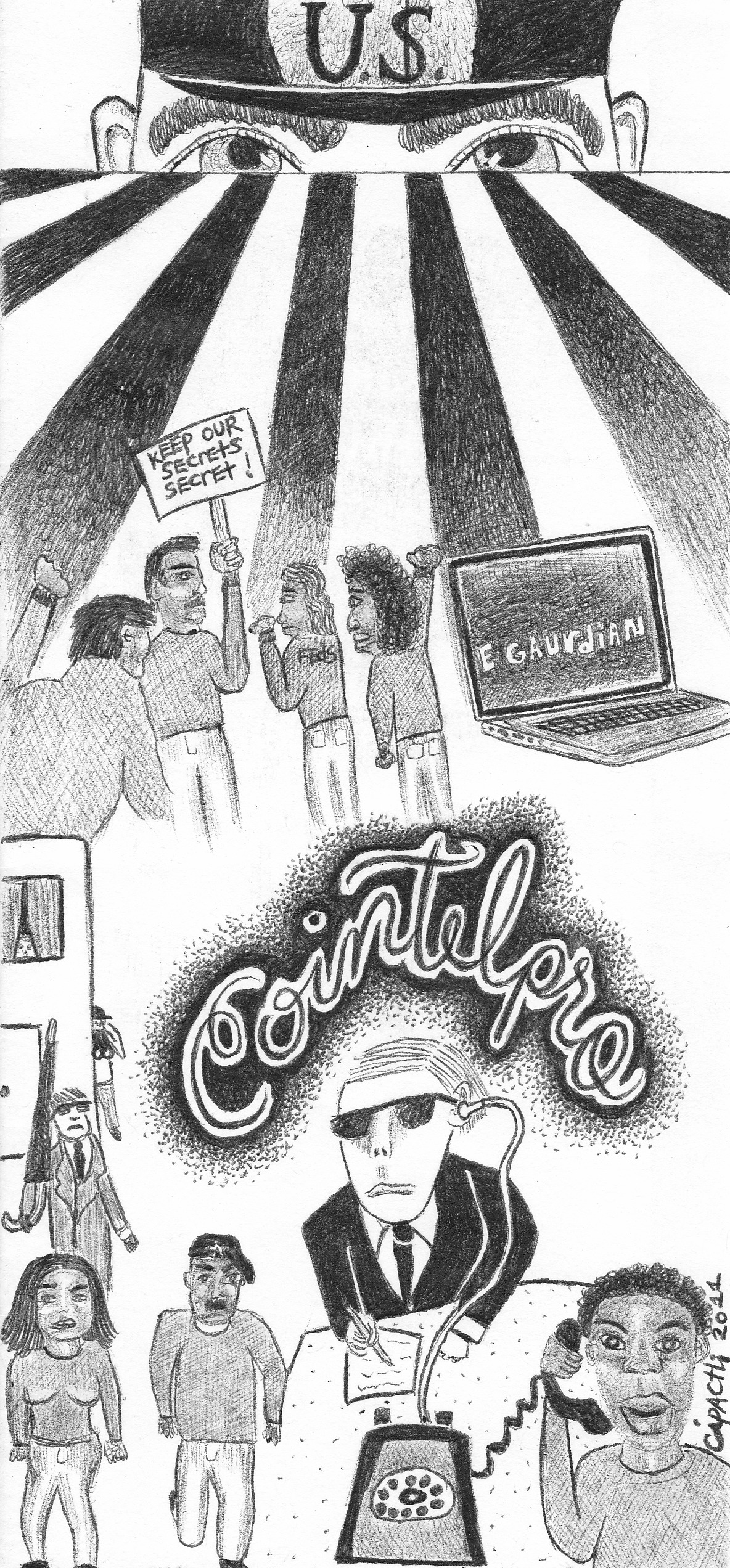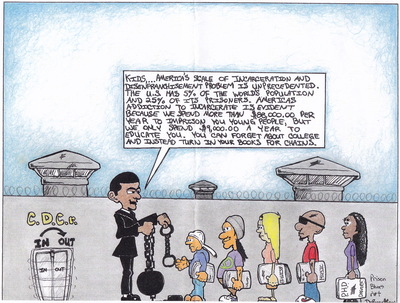
Who's Leading Lumpen Peace Work?
“I was born in jail.” This was Stokely Carmichael’s response to a Swedish reporter in 1967 when asked if he was afraid of being sent to jail for helping to organize the Black nation for national liberation and self-determination.(1) In making this very poignant statement, Stokely Carmichael was putting forward the correct political analysis, referring to the prison-like conditions of the Black nation and other internal semi-colonies of Amerika at the time. It’s been 45 years since then and a string of reformist struggles have proceeded. The completion of the civil rights movement, the appointment of the first Black U.$. Supreme Court “Justice,” and the election of the first Black pre$ident. But have the material conditions of the Black nation truly changed when compared to other First Worlders? According to the Census Bureau statistics for the year 2006, which show more Blacks and Latinos are living in prison cells than college dorms, they have not.(2)
A new documentary titled “The Violence Interruptors: One Year In a City Grappling with Violence” makes this point ever-so-clear. This documentary centers on an imperialist-funded lumpen organization from the streets of Chicago whose membership is primarily made up of ex-gang members. For the most part they have all done some serious time for some serious crimes, but upon their release made a commitment to themselves and their communities that they would help stop the pointless violence that takes so many lives.
These ex-gang members call themselves “Violence Interruptors,” which is a reference to their pacifist tactics. They are funded by the Illinois Department of Corrections, Cook County Board of Commissioners and the U.$. Department of Justice, among others. They run the Violence Interruptors under the guise of the non-profit organization called Cease Fire. The initial idea of the Violence Interruptors program was proposed and partly funded by Dr. Gary Slutkin, who upon returning to Chicago from a medical tour of Africa saw the dire straits of the oppressed here and drew parallels to the African experience. But the organization’s true roots date back to Jeff Fort, whose life centered around his leadership in a Chicago lumpen organization that had one foot in Black nationalism and one in drugs and gang banging.
In federal prison from 1972 to 1976 due to his use of War on Poverty money from the government, Fort took up aspects of Islam and rebranded and restructured the Almighty Black P. Stone Nation when he got out. Along with other leading members, and at times working with the police, he worked to build peace between lumpen organizations and to keep crack out of Chicago. But of course the Amerikan government never likes to see the oppressed come together for the betterment of our people, even if at first they pretend to agree with what we’re doing. So they had Fort arrested and sent back to prison on trumped up terrorism charges, where he remains today. Having successfully neutralized Fort and other early leaders, the Stones today remain a largely divided umbrella for many sets of gang bangers across Chicago, the status quo preferred by the state.(3)
Carrying on Fort’s legacy, Ameena Mathews, a former gangster and Jeff Fort’s daughter, is a Violence Interruptor. Mathews, like other Violence Interruptors, is no stranger to the streets and sees it as her own persynal responsibility to stop the violence, even if it means putting her own life at risk. An example of this is caught on film when during an interview for the documentary that’s being given inside of her home, a fight breaks out on the street. Recognizing that even a one-on-one situation has the potential to turn deadly, she immediately rushed out to try and bring peace to the quickly-growing crowd. While attempting to calm everyone down, a young man saw a rock hurling at his cousin and sacrificially put himself in the line of fire to protect her. He was hit in the mouth. Afterwards threats are made with the promise of gunplay to come, but Mathews quickly ushers the victim away and tells him that he’s the real gangsta because he defended his family and defending their families is what true gangsters do.
Eddie Bocanegra, aka “Bandit,” is another Violence Interruptor who did 14 years for murder, but who, during his imprisonment, went thru a period of reflection. He recognized that he not only fucked up his life but that of his family and the family of the person he killed. Now on the streets Bandit admits to having identified pride with his gang but now sees that it was all pointless. Besides being a Violence Interruptor, Bandit also visits schools across Chicago in an attempt to counsel oppressed nation youth who might find themselves in similar situations to the ones he once did.
In the film, a delegation from South Africa requested to meet the Violence Interruptors during a recent visit to the United $tate$ in order to find out their secret to keeping the peace. Yet, the delegation became critical of one of the Interruptors’ policies, which is to never involve the pigs in the community’s affairs. The delegation argued that the Interruptors were not “neutral enough.” The Interruptors responded that this was the reason that they were so effective within the community, because the community knows they can confide in and trust the Interruptors with their problems without the fear of being sold out. Certainly the masses are correct to think this way. Problems that arise within the community should be dealt with by the community. To bring in the pigs is only to justify the oppression and occupation of the internal semi-colonies and oppressed communities. The potential problem we see with the Interruptors is that the state is happy to fund them as independent mediators for small meaningless violence, but how do the Interruptors deal with community organizations that are not state-funded, and may come into conflict with the state? The Interruptors present themselves as an independent force, but their funding tells us otherwise.
One indication of the Interruptors’ reputation with the community occurs when the family of a young murder victim receives word that his funeral is gonna be shot up by gang members looking for their original target. So seemingly effective and revered are the Interruptors that the murder victim’s family calls them to provide security instead of the police. At the end of the ceremony, Ameena Mathews gives a fiery speech in which she righteously calls out all the gang members in attendance and struggles with them to “get real” with their lives because that dead body they were all there paying their respects to was certainly real, and “it don’t get more real than that!”
While the documentary was being filmed, sections of the Woodlawn neighborhood, an epicenter of violent drama, came into conflict over a plan to militarize Chicago using the National Guard. The plan was developed by politicians with some members of the community. By building a real, independent peace in oppressed communities, we can eliminate the divisions within oppressed communities triggered by the wild behavior of lumpen youth and form a united front to keep the state’s occupation out. The section of the community that spoke out against the call for militarization knows that the National Guard will not provide more safety, only more oppression. This shows that just because the state has gotten smarter about how to control its internal semi-colonies does not mean that they no longer see the need for armed force.
Jeff Fort and the Almighty Black P. Stone Nation’s peace activism legacy lives on in the new federally-funded Violence Interruptors. Similarly, the once largely popular efforts of the Gangster Disciples to hold peace summits in Chicago has evolved into a project that works closely with the political machine of the state. Amerika has proven unable to solve the problems that have plagued the ghetto for generations. While Amerika was worried about what the Stones or the GDs might become, they were scared of what the Panthers already were. They drugged and shot Fred Hampton at age 21, while they eventually sent Fort and Larry Hoover to supermax prison cells with very limited contact with the outside world. While Barack Obama has thousands of people murdered across Africa and the Middle East, we see the level of criminality one must have to become a successful Black leader out of Chicago in this country. The imperialist-funded non-profits use pacifism for the oppressed, while painting mass murder for the oppressor nation as “spreading democracy.”
Many think that the Violence Interruptors have people power, but in fact they do not, for they wouldn’t even exist if they didn’t have the blessing of the oppressors. While the short-term goal of the Interruptors is to “stop the violence,” the long-term goal of the oppressors in creating the Interruptors is to stop the violence from spilling over onto themselves. They do this by not just co-opting grassroots attempts by the people to overcome their oppression and bring peace to the hood, but by creating organizations such as the Violence Interruptors which in the final analysis are nothing more than sham organizations; it is the bourgeoisie laughing at us.
In the Third World the bourgeoisie forms shadow organization and calls them “communist” in order to split the people and stop them from launching a People’s War. In the imperialist countries, like here in the U.$., they either co-opt or infiltrate and wreck those organizations already in existence. While the Panthers were given nothing but the stick, the Stones themselves were easily distracted from the path of the Panthers with the carrot of a little money from the War on Poverty. After destroying any independent mass movements, the imperialists allow and even encourage groups that promote integration or confuse the masses.
While it is true that there is only so much that we can do for the betterment of our class given our current position as oppressed nations within the belly of the beast, we must also recognize the importance of social consciousness on social being and stop letting the circumstances of our imprisonment both in here and on the street dictate to us the confines of our reality. We must come together and build our reality. We must come together and build our own institutions that are there to serve us; institutions of the oppressed. The Black Panthers had this power and we can too. We must learn to reject the bourgeois notion of power, which is only crude power and serves to oppress and exploit. This type of power is currently exhibited by many LOs, both in here and on the streets.
While commending those individuals within the Violence Interruptors who really are trying to do their part to stop the violence, we must also draw a clear line between fighting for self-determination of the oppressed and serving as the friendly face of the imperialist state. We need more allies on the streets doing this work in support of the efforts of MIM(Prisons) and USW in building peace on the inside. Only by building our own institutions of the oppressed will we truly be able to stop the violence that takes so many lives and keeps a substantial portion of oppressed nation youth behind bars.
Brown and Black Unite!
All Power to the Oppressed!




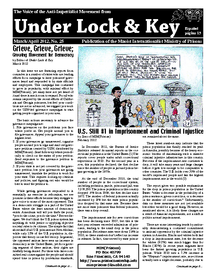
 Download printable PDF
Download printable PDF



